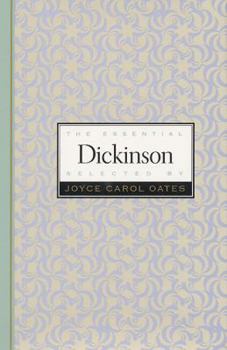The Essential Dickinson (Essential Poets)
Select Format
Select Condition 
Book Overview
Emily Dickinson saw fewer than twenty of her 1,775 poems published during her lifetime: when she died in 1886, her obscurity as a poet was nearly total. Now widely recognized as one of the great American poets of the nineteenth century, she is one of a handful from any period whose enduring stature in the world of letters is matched by the loyal affection of generation after generation of readers. In this distinguished addition to The Essential Poets series, Joyce Carol Oates presents a "personal--yet not private" collection of Dickinson favorites, selecting from relatively obscure works as well as better-known poems to illuminate Dickinson's often unacknowledged range. Oates takes care to introduce us to the poet's subversive playfulness; to her rebellious nature and radical aesthetic; to her gender-bending persona and surprisingly wicked humor. At the heart of this collection, of course, stands the work that made Dickinson's reputation as one of America's great visionary poets: an artist who has written with stoic control and astonishing lucidity about the soul's darkest, most terrifying hours. A concise and illuminating introduction to the work of an essential poet, The Essential Dickinson is also an extraordinary tribute from one remarkable woman and writer to another. It confirms once again that great art endures, in Auden's striking phrase, "in the guts of the living."
Format:Hardcover
Language:English
ISBN:0880014946
ISBN13:9780880014946
Release Date:November 1996
Publisher:Ecco
Length:94 Pages
Weight:0.42 lbs.
Dimensions:6.8" x 0.5" x 5.3"
Customer Reviews
1 rating
Lovely Verse, Passionately Performed
Published by Thriftbooks.com User , 15 years ago
I'm not, generally speaking, a poetry kind of guy, but this is by a poetess personality with whom I am in sympathy. Her self-imposed, mostly secluded adult existance away from humankind has always made me wonder and appreciate her. I once worked with an old and very experienced female newspaper reporter who once said to me in disgust: "You know, people are just no damned good." I also remember a quote from somewhere, by Charles Bukowski I think, that said: "I like people, but I seem to feel better when they're not around." There seems to be a peace and stillness not to be found elsewhere in living mostly apart from others and not participating in their frantic money gathering, incessant and/or nonsensical babbling, their grand propensity for violence in it's many forms, self-idolizations and their hippocracies. She died for beauty, but from her writing I perceive she found much in nature, but didn't find so much in humankind. Just a sprinkling here and there, and maybe that's enough. Her comments about religion and church-going make me smile. She seems to have been an insightful genius. The recording is just fine.





